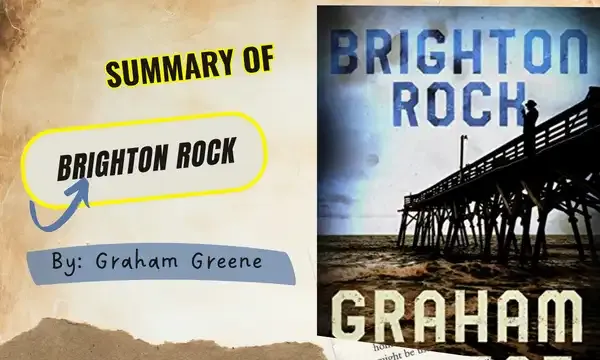Brighton Rock by Graham Greene explores the themes of evil, guilt, and redemption through the story of a young, ruthless gangster named Pinkie Brown.
 |
| Summary of Brighton Rock by Graham Greene |
The general idea of the Brighton Rock book
- The nature of evil: The novel delves into the dark recesses of human nature, portraying Pinkie as a cold-hearted and remorseless criminal. It raises questions about the origins and consequences of evil actions.
- Guilt and its impact: The characters in Brighton Rock grapple with guilt and its corrosive effects on their lives. Greene explores how guilt can consume individuals and drive them to desperate measures.
- Redemption and religious symbolism: The presence of Catholicism and religious symbolism underscores the theme of redemption. The characters navigate their moral dilemmas within a religious framework, highlighting the struggle between sin and salvation.
Brighton Rock book chapters
- "Hale": This chapter introduces the murder of a journalist named Kite and the subsequent investigation. It establishes the central conflict and introduces Pinkie Brown.
- "Rose": In this chapter, Pinkie becomes involved with Rose, an innocent young woman. Their relationship becomes entangled in Pinkie's criminal activities, leading to tensions and moral dilemmas.
- "The Boy": This section focuses on Pinkie's childhood and background, shedding light on his motivations and the factors that contribute to his twisted nature.
- "Idda": Pinkie encounters Ida, a fierce and determined woman who suspects his involvement in Kite's murder. This chapter explores the power dynamics between the two characters and their conflicting agendas.
- "Dallow": Dallow, a rival gangster, enters the picture, posing a threat to Pinkie's power and control. The chapter builds up to a climactic confrontation between the two characters.
- "The Edge": The final chapter brings the story to its conclusion, as Pinkie faces the consequences of his actions and must confront his inner demons. The theme of redemption takes center stage.
Brighton Rock Book Conclusions
- Brighton Rock examines the nature of evil and the destructive power of guilt.
- The novel portrays a struggle between sin and redemption, often through religious symbolism.
- Characters face moral dilemmas and make choices that shape their fates.
- Pinkie's journey represents a dark exploration of human nature and the potential for change.
About the author of Brighton Rock Book
Graham Greene was a British author known for his works exploring moral and political themes. He wrote extensively on the human condition, often delving into questions of sin, guilt, and redemption. His Catholic background heavily influenced his writing, as seen in Brighton Rock.
Read more:
Summary of American Psycho by Bret Easton Ellis
Summary of No Country for Old Men by Cormac McCarthy
Brighton Rock book in relation to other books
Brighton Rock can be compared to other works of crime fiction and psychological exploration, such as Fyodor Dostoevsky's Crime and Punishment or Truman Capote's In Cold Blood. These novels delve into the dark aspects of human nature and the consequences of immoral actions.
Brighton Rock book audience
Brighton Rock appeals to readers interested in psychological exploration, crime fiction, and moral dilemmas. Its themes and character-driven narrative make it suitable for mature audiences who appreciate thought-provoking literature.
Reception or Critical Response to the Book
Brighton Rock was initially met with mixed reviews upon its publication in 1938. However, over time, it has come to be regarded as one of Graham Greene's seminal works and a classic of British literature. Its exploration of morality and the depths of human nature continues to resonate with readers.
Brighton Rock Book Publishing Date
Brighton Rock was published by William Heinemann Ltd in 1938.
Recommendations for other books
If you enjoyed Brighton Rock, you may also enjoy these similar books:
- Crime and Punishment by Fyodor Dostoevsky
- In Cold Blood by Truman Capote
- The Talented Mr. Ripley by Patricia Highsmith
- No Country for Old Men by Cormac McCarthy.
